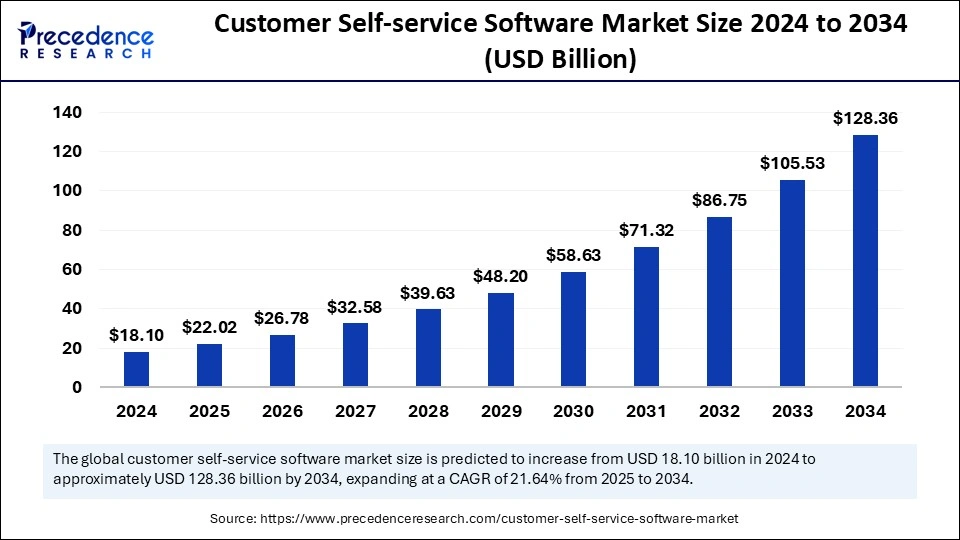Customer self-service software market size was estimated at USD 18.1 billion in 2024 and is expected to hit around USD 128.36 billion by 2034, growing at a CAGR of 21.64%.

Customer Self-service Software Market Key Takeaways
- North America dominated the global market with the largest market share of 32% in 2024.
- Asia Pacific is poised to witness the fastest growth during the forecast period.
- By solution, the web self-service segment led the market in 2024.
- By solution, the virtual assistant segment is expected to grow to the highest CAGR durin the forecast period.
- By service, the professional services segment held the largest market share in 2024.
- By service, the managed services segment is projected to grow at the fastest CAGR over the studied period.
- By deployment, the cloud segment contributed the highest market share in 2024.
- By deployment, the on-premises segment is likely to witness the quickest growth in the upcoming period.
- By end-use, the BFSI segment generated the major market share in 2024.
- By end-use, the healthcare segment is anticipated to witness the fastest growth during the projection period.
Market Overview
The customer self-service software market has witnessed remarkable growth as organizations strive to enhance customer experiences while reducing operational costs. Customer self-service software enables users to access support, obtain information, and resolve issues independently through various digital channels, including chatbots, IVR, FAQs, and virtual assistants.
In 2024, the market was valued at USD 18.1 billion and is projected to reach USD 128.36 billion by 2034, reflecting a robust CAGR of 21.64%. The growing demand for seamless and efficient customer support, along with the increasing adoption of AI and automation technologies, is propelling market expansion.
Additionally, the widespread use of smartphones and the internet has made self-service solutions more accessible, contributing to the rapid adoption of these platforms.
Drivers
The increasing need for 24/7 customer support and faster query resolution is driving the adoption of customer self-service software. Organizations are recognizing the importance of delivering personalized and efficient services to enhance customer satisfaction. AI-powered chatbots and virtual assistants are enabling businesses to automate routine tasks and provide real-time assistance, reducing the burden on customer support teams.
Additionally, advancements in NLP and machine learning have enhanced the accuracy and efficiency of self-service platforms, allowing them to handle complex queries effectively. The growing emphasis on cost optimization and operational efficiency further fuels the demand for self-service solutions, enabling organizations to reduce customer service expenses while maintaining high service standards.
Opportunities
The increasing integration of AI and predictive analytics presents numerous growth opportunities for the customer self-service software market. AI-driven solutions can analyze customer behavior patterns, anticipate their needs, and offer personalized recommendations, enhancing overall customer engagement. The rising adoption of cloud-based self-service platforms is another significant opportunity, as cloud solutions offer scalability, flexibility, and cost-effectiveness.
Additionally, the expansion of e-commerce and digital platforms, particularly in emerging markets, is creating a higher demand for efficient self-service solutions. Organizations are also exploring the use of self-service software to enhance omnichannel engagement, ensuring consistent and seamless experiences across multiple touchpoints.
Challenges
The customer self-service software market faces challenges related to data security and privacy concerns. As self-service platforms handle vast amounts of sensitive customer data, ensuring data protection and compliance with regulations is critical. Integrating self-service solutions with existing IT infrastructure and legacy systems can also be a complex and time-consuming process.
Additionally, maintaining the quality and relevance of responses provided by self-service platforms is essential to prevent customer dissatisfaction. Poorly designed or outdated self-service systems can lead to negative customer experiences, undermining the effectiveness of these solutions. Organizations must also allocate resources to continuously update and optimize their self-service platforms to keep pace with evolving customer expectations.
Regional Insights
North America continues to dominate the customer self-service software market, owing to the strong presence of technology giants and the early adoption of advanced customer engagement solutions. The region accounted for the largest market share in 2024, driven by the widespread adoption of AI-powered self-service technologies in the United States and Canada.
Asia Pacific is anticipated to witness the highest growth rate during the forecast period, fueled by rapid digitalization, increasing internet penetration, and growing demand for automated customer support in countries such as China, India, and Japan. Europe is also experiencing significant growth, supported by the rising focus on enhancing customer experiences through innovative self-service platforms. Latin America and the Middle East & Africa are gradually expanding their adoption of self-service technologies, driven by the need for efficient customer engagement solutions.
Recent Developments
Recent developments in the customer self-service software market highlight the growing focus on AI-powered innovations and automation. Companies are investing in developing advanced chatbot technologies that can understand complex queries and deliver personalized responses. Leading technology providers are enhancing their self-service platforms with predictive analytics and machine learning capabilities to anticipate customer needs more effectively.
Cloud-based self-service solutions are gaining traction due to their scalability and cost-efficiency. Strategic mergers, acquisitions, and partnerships are further strengthening market growth by enabling companies to expand their offerings and improve service capabilities. The introduction of conversational AI platforms is revolutionizing customer interactions by providing more intuitive and engaging experiences.
Customer Self-service Software Market Companies
- Salesforce, Inc.
- Oracle
- Microsoft
- SAP SE
- Zendesk
- Freshworks Inc.
- Avaya LLC
- Zoho Corporation Pvt. Ltd.
- HubSpot, Inc.
- Verint Systems Inc.
Segments Covered in the Report
By Solution
- Web Self-service
- Mobile Self-service
- Virtual Assistants
- Email Engagement
- Interactive Voice Response (IVR)
- Others
By Service
- Managed Services
- Professional Services
- By Deployment
- Cloud
- On-premises
By End-use
- BFSI
- Manufacturing
- Retail & E-commerce
- Media & Entertainment
- IT & Telecom
- Healthcare
- Government
- Others
By Region
- North America
- Europe
- Asia Pacific
- Latin America
- Middle East and Africa
Ready for more? Dive into the full experience on our website!
